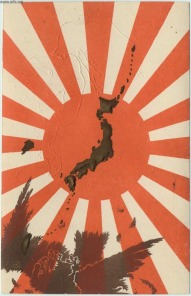Musical Trip to Japan During WW2
Lets Travel Back To Japan In WW2!
Music pieces that are included:
(1937)Umi Yukaba, composed by Kiyoshi Nobutoki, lyrics based on a choka poem by Otomo no Yakamochi. Origin : Japan
Umi Yukaba was a patriotic song that gained popularity during the world war two era, although the song has a very uplifting melody it is accompanied with a fluctuating range from high to low making the song very emotional, the rhythm also strikes high emotions being very unique and non repetitive. In comparison to a lot of the other Japanese war songs such as our next piece this one takes the repetitive nature along with the dark and brooding, then replaces it with happiness and uplifting which makes this song much more disturbing, it is easy to be fooled. The Japanese and lyrics written had darker intentions with this uplifting melody, as it was reported by Enemy In The Mirror that it was usually was sung before takeoff by a kamikaze suicide bomber. The lyrics read the following "if I go away to the sea, I shall be a corpse washed up. If I go away to the mountain, I shall be a corpse in the grass. But if I die for the Emperor, It will not be a regret." These lyrics suggest that suicide to serve the Emperor is to be celebrated or congratulated. The acceptance of death for honor is a trade the suicide bomber was willing to make, though it is to serve their country and a song of pride it is nothing but eerie now in my opinion.
(1885) Battotai March, Composed and Written by The Meji Government, Origin: Japan
The song Battotai March was made in lieu of the Battotai who fought in the Sastuma Rebellion according to all the information I could find which mostly included wikipedia although I did match the information against many other wiki pages and descriptions of the song, so this has been thoroughly background checked. This song has a powerful sound but not necessarily uplifting in comparison to the melody presented in Umi Yukaba. It has a powerful beat which is essential for any sort of march, the range and rhythm stays decently consistent as it could almost come off as sort of flat if not for the beat. The song features 107 beats per minute aka tempo, so decently quick which could definitely explain how it is so overwhelming! It is just fast enough though to really capture that marching instead of speeding up the pace excessively and losing the ability to follow a long in that fashion.
Unlike the previous discussed piece this song with its fast paced tempo and loud beat absolutely capture the march into battle as well as its lyrics, the words used are also far less gruesome than those in the Umi Yukaba which is quite comical suggesting that one sounds like it is meant for an army, while the other sounds like it could be used in a tea party. The lyrics speak about the relationship between the Japanese and the enemy, speaking again that they aren't afraid of death hut in contrast to the last piece they also expect victory and want to please the Emperor.
My personal reaction
The transformation in sound between the two songs was not only massive, it was eerie and disturbing considering the use. The second piece I had chosen had a more fitting set of lyrics to the sound which was comforting in some odd way, considering it was used for war having it be more dark and brooding settled nerves and created an appropriate feeling for the occasion. One almost felt disrespectful towards life itself as well as dark and twisted, the lyrics spoke of death being accepted and wanted. Corpses washing up on the shores and bodies in fields, glorifying and praising mass genocide of their own people. All while happily seeing along to the eerie uplifting beat, it truly gives insight into how utterly terrifying war is. To sum this up the second piece feels as though it prepares you for action and numbs the reality of what is happening, the other is twisted and is almost impossible to relate to or understand as a human being. Ignorance is definitely bliss in this day and age.
Bibliography
Smith, M. (2023, August 22). Umi Yukaba 海行かば. Enemy in the Mirror. https://www.enemyinmirror.com/umi-yukaba-wikipedia-free-encyclopedia/
Wikimedia Foundation. (2023, October 13). Battōtai (song). Wikipedia. https://en.wikipedia.org/wiki/Batt%C5%8Dtai_(song)#:~:text=%22Batt%C5%8Dtai%22%20(%E6%8A%9C%E5%88%80%E9%9A%8A%2C,Rikugun%20bunretsu%20k%C5%8Dshinkyoku%20in%201912.



The dissonance between lyric and the melody truly is haunting on that first song. I appreciate this look back into history. Looking at history, there's always important insight to be found, and music is no exception.
ReplyDeleteInteresting fact, Kamikaze solders who failed to complete there mission were often fearful of returning, or calling for help, as they believed it would dishonor them. Umi Yukaba has a kind of ominous tone, like "The calm before the storm sound." as for Battotai March I now understand why propaganda works. With the rhythm, and he melody and the lyricism it was a bone chilling song, that made me fell uneasy, and intrigued, at the same time.
ReplyDelete